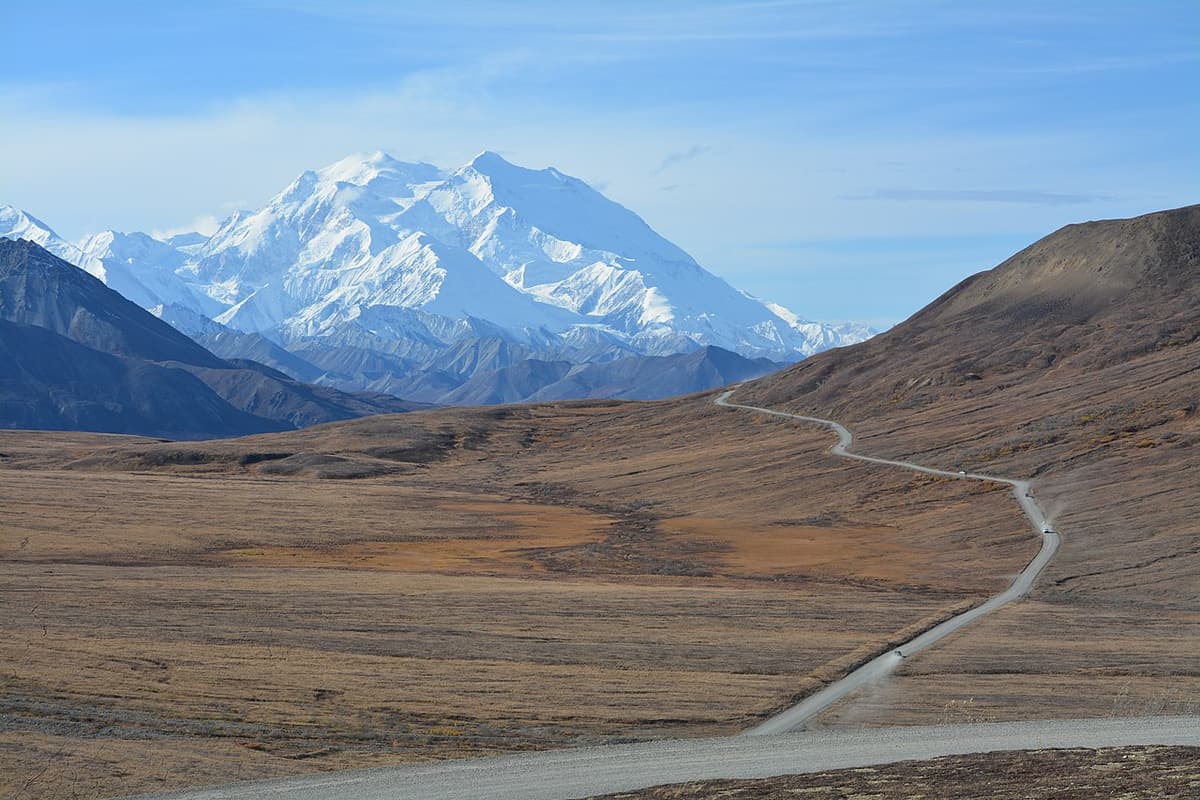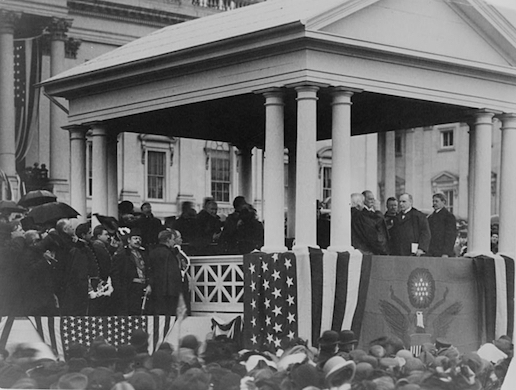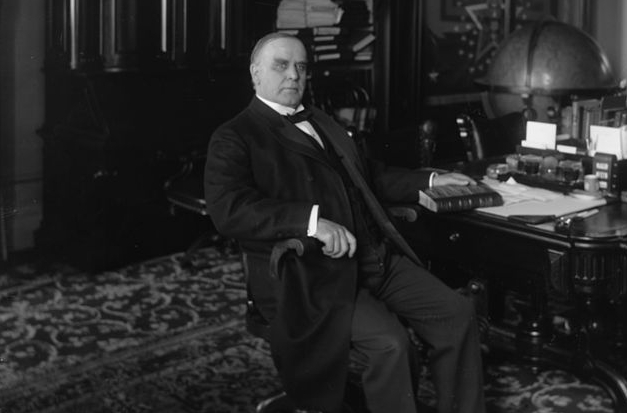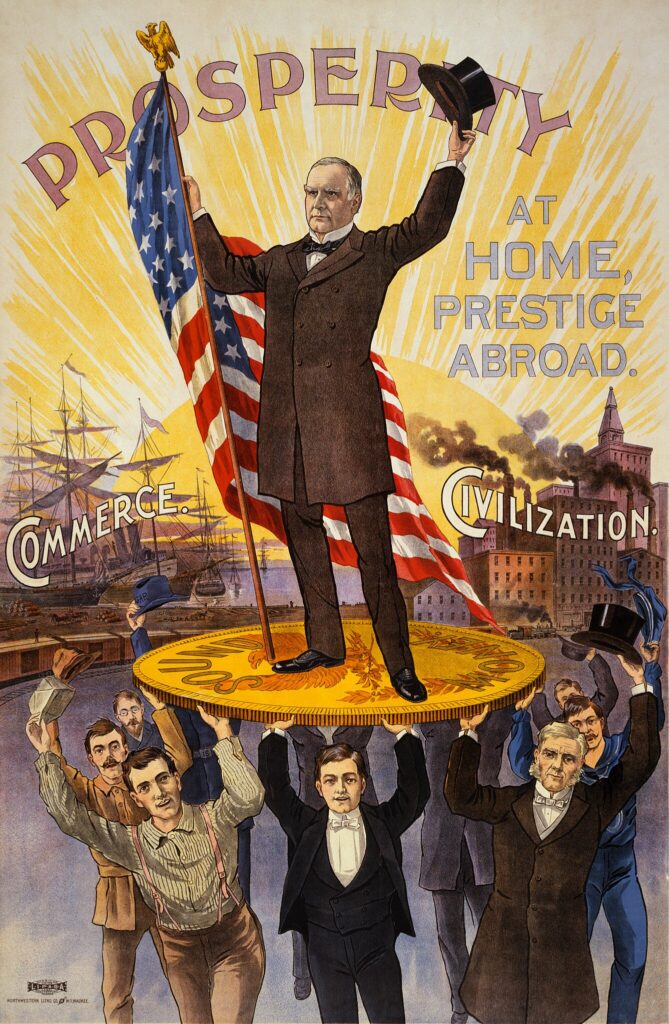Trump Promises To Restore McKinley to the Mountain That, at the Suggestion of the Sun, Bore His Name So Proudly
‘I think he deserves it,’ says the President-elect.

President Trump is pledging to restore the name of President McKinley, his model on tariff policy, to North America’s tallest mountain. It’s a move he promised in 2015 — one that will please Ohioans smarting over President Obama snubbing their martyred native son while angering many Alaskans.
“President McKinley was the one responsible for creating a vast sum of money,” Trump said at Turning Point USA America Fest on Sunday. “That’s one of the reasons that we’re going to bring back the name of Mount McKinley, because I think he deserves it.”
On January 24, 1897, William Dickey, christened the 20,000-foot summit in The New York Sun. The gold prospector’s account, “Discoveries in Alaska,” then a territory, was then picked up by newspapers and spread nationwide.
Dickey wrote that his men had “named our great peak … after William McKinley of Ohio, who had been nominated.” It was “the first news we received on our way out of that wonderful wilderness.” It would not be too much to suggest that the Sun named the mountain.
Dickey had run into many silver prospectors who backed the Democratic presidential candidate, William Jennings Bryan, who favored the free coinage of the less valuable metal. Choosing to honor McKinley — who Mr. McKinley called “Champion of the Gold Standard” — was a stinging rebuke.

As I wrote for the Sun in October, Trump has made a “mentor” of McKinley on tariffs. On “The Joe Rogan Experience” podcast, Trump said then that America “had so much money” in McKinley’s era that “we didn’t know what to do” with it.
Trump called McKinley “the Tariff King” and summarized his predecessor’s policy. “We will not allow the enemy to come in,” he said, “and take our jobs and take our factories and take our workers and take our families unless they pay a big price — and the big price is tariffs.”
In August of 2015, Trump had posted on what was then Twitter that Mr. Obama wanted “to change the name of Mt. McKinley to Denali after more than 100 years. He said it was a “great insult to Ohio. I will change back!”

Mr. Obama made the change official the following month. He chose one of the peak’s many previous names — one native tribe’s word, “Denali,” meaning “the high one” — undoing decades of wrangling and compromises between McKinley’s native state, Ohio, and Alaska, where the mountain stands.
An Ohioan, Speaker Boehner, objected to Mr. Obama’s action, saying McKinley’s name was a “testament to his great legacy.” Senator Portman, then representing the Buckeye State, tweeted that he was also “disappointed” with the decision.
The 13 Republican members of Ohio’s congressional delegation signed a complaint about the “troubling” action Mr. Obama had taken. “William McKinley’s legacy,” the message read, “has been tarnished by a political stunt.” It also noted that the president hadn’t notified the McKinley family.
McKinley’s two daughters died before adulthood; so, his great-great nephew, Masse McKinley, safeguards and promotes his legacy. “I applaud President-Elect Trump for remembering McKinley’s contributions to this country,” he told the Sun today, “and for making this name change a possible reality.”
Mr. McKinley, current president of the Society of Presidential Descendants, says his collateral ancestor “possessed legendary leadership skills” and “ushered in a century of unrivalled golden age prosperity, much of what America still enjoys today.” He’s able to “think of no better way to honor and commemorate the memory” of the 25th president “than to bring back the magnificent name of Mount McKinley.”
In October 2017, 100 years after the federal government had made the Sun’s name for the granite pinnacle official, Trump consulted two Republicans of Alaska, Senators Sullivan and Murkowski Mr. Sullivan told the Alaska Dispatch News at the time that Trump had asked if he wanted him to “reverse” Mr. Obama’s action and return McKinley to the map.
Mr. Sullivan said he and Ms. Murkowski “jumped over the desk” and said, “No! No. Don’t want to reverse that.” He explained that one of Alaska’s native tribes, the Athabascans, of which his wife is a member, had called the mountain Denali for 10,000 years. Trump acceded to their wishes.
Denali boosters make much of the fact that McKinley, the last Civil War veteran to serve as president, known as the Major for his rank, never visited Alaska. However, his life was cut short by an assassin in 1901. While in office, the trip — dangerous on locomotives — would have put him out of communication and required leaving America, which no president had yet done.

Such arguments have implications for Washington’s current political dynamics. Trump’s vice president elect, Senator Vance, represents Ohio, while Ms. Murkowski voted to convict on Trump’s second impeachment, has bucked his policies, and waffled on supporting some of his Cabinet nominees.
Floating a restoration of the McKinley name could be leveraged to nudge Ms. Murkowski in line. With an eye toward the 2026 midterm elections and 2028 presidential race, in which Mr. Vance may be a candidate, Ohio carries more weight. It holds 17 electoral votes to Alaska’s three.
The author of “President McKinley: Architect of the American Century,” Robert W. Merry, weighed in when I interviewed him two months after Mr. Obama’s order. “I didn’t get too concerned about it,” he said, “and I don’t think McKinley would have cared very much about it one way or another.”
Having studied McKinley, this columnist would have to agree. The Major was a humble leader who rejected accolades including the Congressional Medal of Honor. “All a man can hope for … when he is dead,” he said, is “to be an inspiration for history.”

